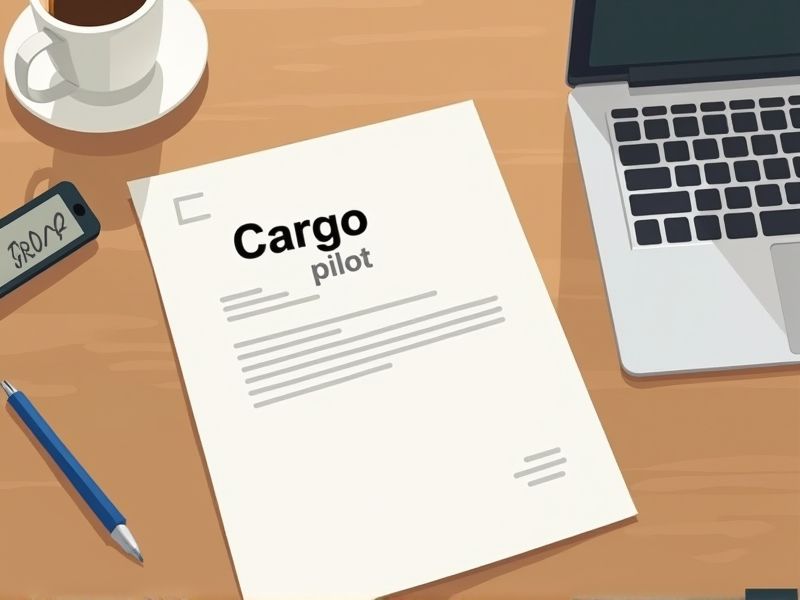
Cargo pilots require specific certifications to ensure they can safely and efficiently manage the complexities of transporting goods worldwide. Each certification verifies a pilot's proficiency in handling various aircraft types and understanding logistics challenges that differ from passenger flights. Specialized training in navigation, weight balance, and hazardous materials is often mandated to meet international aviation standards. Key certifications you may need as a cargo pilot include these crucial credentials.
Commercial Pilot License (CPL)
A Commercial Pilot License (CPL) is essential for a cargo pilot as it certifies the individual to operate aircraft professionally, ensuring safety and regulatory compliance. With a CPL, airlines verify the pilot's training in complex maneuvers required for cargo operations, which carry significant weight and require precise handling. It also demonstrates the pilot's understanding of air traffic control procedures, vital for navigating the busy airspace typical of commercial shipping routes. A CPL confirms the pilot's proficiency in conducting operations under instrument flight rules, crucial for weather-independent transportation of goods.
Airline Transport Pilot License (ATPL)
Obtaining an Airline Transport Pilot License (ATPL) ensures that a cargo pilot has achieved the highest level of aeronautical knowledge and experience. This licensure is necessary as it guarantees adherence to rigorous safety standards, particularly due to the complex nature of cargo operations. ATPL holders are also trained to make informed, critical decisions in high-pressure environments, essential for managing unexpected situations during flight. The license acts as a regulatory requirement, signifying a pilot's readiness to operate large and advanced aircraft commercially, which is often required for cargo transportation.
Instrument Rating (IR)
Instrument Rating (IR) is crucial for cargo pilots as it enables them to operate flights solely based on instruments, essential when weather conditions obscure visual references. This capability enhances safety, allowing flights to continue through clouds, fog, or night-time conditions, which often occur in cargo operations. Cargo flights, frequently scheduled during off-peak hours for efficiency, face variable weather and low visibility, necessitating IR for operational reliability. Without IR, cargo pilots would be limited to visual flight rules, drastically reducing their ability to maintain schedules and deliver timely services.
Multi-Engine Rating (MER)
Cargo pilots often fly larger aircraft requiring multiple engines, necessitating a Multi-Engine Rating (MER). Multi-engine aircraft provide increased power and redundancy, crucial for the safety of cargo operations. Airlines typically operate cargo flights across longer distances, requiring aircraft with more capacity and reliability. A multi-engine rating ensures that pilots are adequately trained to handle complex systems and emergency scenarios unique to these aircraft.
Type Rating for Cargo Aircraft
Type rating for cargo aircraft is needed because it ensures the pilot is trained to handle the specific systems and performance characteristics of the cargo plane. Cargo aircraft often have unique configurations and operational procedures that differ from passenger planes. Proper type rating helps maintain safety standards by equipping pilots to manage emergencies tailored to these aircraft. Regulatory authorities mandate type rating certifications to ensure pilots meet required proficiency levels for each specific aircraft model.
Dangerous Goods (DG) Certification
Dangerous Goods (DG) Certification ensures that cargo pilots are adequately trained to handle hazardous materials, reducing the risk of accidents. The certification provides knowledge on regulations and proper handling techniques mandated by aviation authorities. Without this certification, the likelihood of improper packaging and labeling increases, potentially endangering flight safety. DG Certification plays a crucial role in compliance with international standards, facilitating global trade and transportation.
Aviation Security Certification
Aviation security certification ensures that cargo pilots understand and comply with security protocols, reducing the risk of aircraft-related threats. Such certification educates pilots on handling hazardous materials and recognizing potential security breaches. With proper certification, pilots are better equipped to implement emergency procedures, maintaining safety for passengers and cargo. Regulatory bodies mandate this certification to standardize safety measures and enhance overall aviation security.
Aeronautical Decision Making (ADM) Certification
Cargo pilots face unique operational challenges, such as unpredictable weather conditions, which necessitate the aeronautical decision-making (ADM) certification to enhance safety and efficiency. Effective ADM training equips pilots with critical thinking skills to anticipate and mitigate potential risks during flights, including deviations in scheduled routes. The certification focuses on developing systematic decision-making processes, crucial for cargo pilots who often fly long hours and may encounter unexpected issues mid-flight. The ADM certification contributes to safer aviation practices, ultimately reducing the likelihood of accidents and incidents in the cargo industry.
Crew Resource Management (CRM) Certification
Cargo pilots often operate in environments where communication inconsistencies may lead to operational misunderstandings. CRM training enhances teamwork and decision-making skills, reducing the likelihood of errors in judgment or communication. The unpredictable nature of weather and logistics in cargo operations benefits from CRM skills that foster adaptability and problem-solving. Regulatory bodies and airlines prioritize CRM certification to maintain safety standards and efficiency in cargo transportation.
Advanced Aviation Safety Certification
Advanced Aviation Safety Certification enhances the proficiency of cargo pilots in handling complex and high-risk situations, thereby reducing the likelihood of accidents. Advanced training ensures compliance with evolving safety regulations, which is vital for maintaining insurance and operational standards. It equips pilots with the latest skills in navigation and communication technology, essential for managing cargo over diverse and challenging routes. By emphasizing risk management and emergency response, the certification process contributes to the overall safety and reliability of cargo operations.
Summary
By obtaining additional certifications, you can significantly enhance your expertise and value as a cargo pilot. These credentials often lead to increased job opportunities, allowing you to qualify for more advanced positions. You may also experience higher earning potential, as specialized certifications typically justify better compensation packages. Gaining such qualifications can improve your overall confidence and proficiency in handling complex logistical operations.
